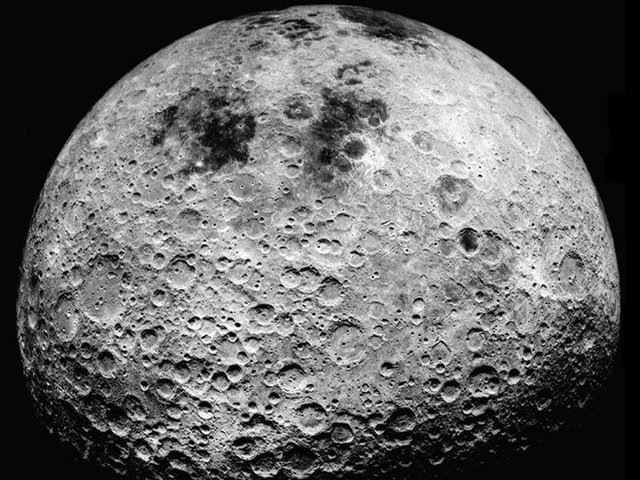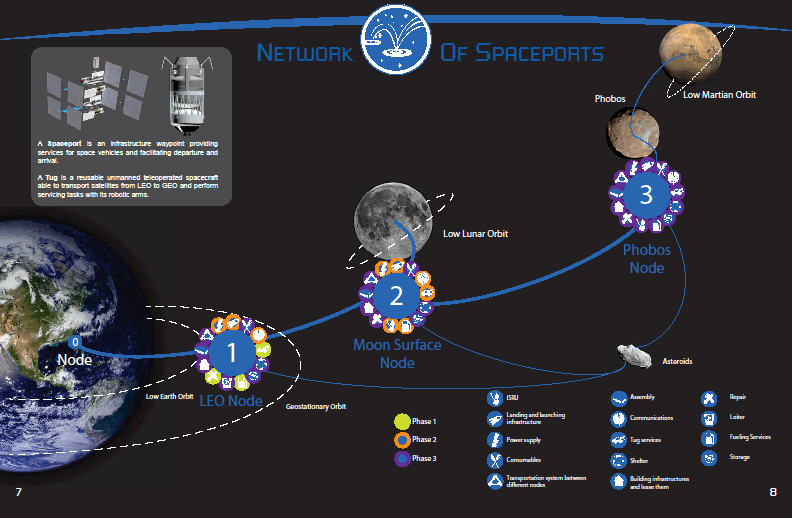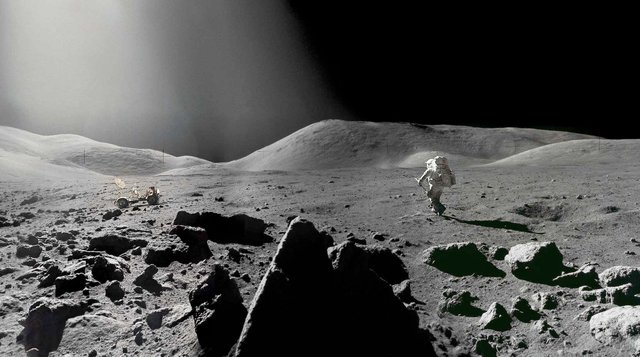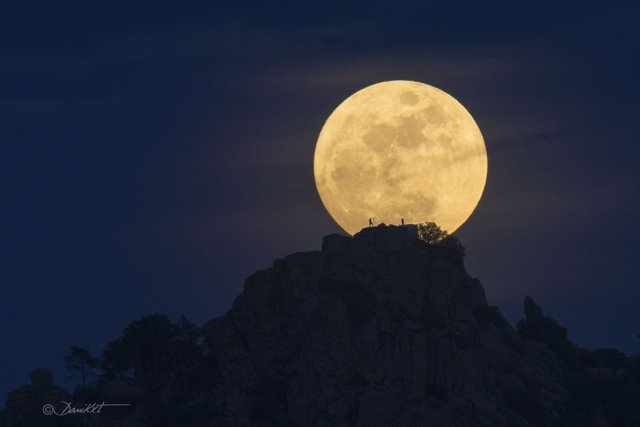Why We Should Colonize the Moon before Mars

(Source)
Whenever the general public talks about space exploration these days, the fixation is on Mars. Mars is the desired gem, supposedly just out of reach. We feel that we are almost there. But in reality, many scientists feel that that is not the case. Elon Musk's ambitious revelation of his plans to build a colony on Mars over the next few decades is just that: ambitious. While dreams and great ambitions certainly have their place, there is also something to be said for realism. And many scientists feel that Musk's plan, or even Congress' newly approved plan for funding NASA efforts to reach Mars, are just not realistic.
There are many who propose to shoot for a colonization of the Moon first, and to then work our way outwards. However, both sides make strong arguments. Proponents for the Moon say that it is cheaper, could be done with existing technology, and would allow us to build an applied knowledge base off of which to build a plan for Mars. Those who advocate for Mars argue that the Moon would be useless to mankind as it has little to no natural resources, and is ultimately a dead planetary body.

What A Lunar Base Might Look Like - (Source)
Over the next two days, I am going to write an article showcasing the argument for the Moon, and an article showcasing the argument for Mars. So without further ado, the argument for the Moon.
Overall Arguments
Cost-
The cost for sending a manned and permanent mission to Mars is hard to estimate.
A mission to create a permanent Lunar base has been estimated to cost somewhere around $10 billion. Considering that NASA has an annual budget of approximately $19 billion, that is entirely feasible (granted, only 3-4 billion of those dollars are actually for flight operations, but still).Distance-
This particular line of thinking is hard to argue with. Since the Moon is not in a circular orbit around Earth, the distance between the two fluctuates. However, on average the Moon is approximately 250,000 miles away. On the other hand, Mars is an average of about 225,000,000 miles away. Should something go wrong, it would be significantly easier to send material reinforcements, or even a rescue mission, to the Moon.Technology-
We have all the technology we need to at least reach the Moon with a manned mission. We've had that since the Apollo missions. As of right now, it's incredibly difficult to even send a rover to Mars.The potential for a Lunar refueling station-
Landing a colony on the Moon would be an essential stepping stone for creating a refueling station for missions that want to reach further into the solar system. One of the greatest current barriers to space exploration is the fact that a spaceship can only carry so much fuel. Building a refueling station on the moon could lead to deeper exploration, and could further serve as a stepping stone to Mars.

Project OASIS, a proposed network of refueling stations - (Source)Winning Future Funding -
Something that NASA, and space programs worldwide, have been missing for the last 30 years or so is a spark in the public imagination. While I feel it is growing, the public desire to reach space is nothing like it was during the golden age of the 60's and 70's. Putting a colony on the moon could put space exploration back on the public radar, and help to win funding for later programs. Further, it would give private space companies (like SpaceX and Blue Origin) the ability to start marketing space flight to individuals, creating further funding and public interest. Even Elon Musk, who is known for his ambitious, and at times hyperbolic, visions of space travel admits that a colony on Mars would take a bare minimum of 40 years to set up.We don't know what we don't know-
All of our manned missions to the Moon were in the 1960's and 1970's. We haven't even sent a rover to the Moon in 40 years. With the amount that technology has improved since then, we have no idea what we still don't know about the Moon. With the significantly lower cost of reaching the Moon as opposed to Mars, it seems self-evident that going to the Moon first might yield enormous scientific discoveries that could make it far easier to attempt any other kind of colonization.

Apollo 17, the last manned lunar mission - (Source)
Conclusion
I just threw a lot of reasons at you. From cost, to distance, to current technology levels, to a general lack of preparedness, colonizing Mars may just be too ambitious to attempt right now. Colonizing the Moon, on the other hand, could a yield a plethora of advances to aid us in reaching further into the solar system. It is significantly cheaper, closer, and eminently more attainable.
It is true that the Moon perhaps does not spark as much public fervor as Mars in the short term. However, imagine this.
First Successful Extraterrestrial Colony
That is the headline that could be seen on newspapers and blogs worldwide. If that does not create public, and ultimately governmental, support for space exploration, I don't know what will.

Who said the Moon couldn't be exciting? - (Source)
Sources
- http://www.sciencealert.com/nasa-scientists-say-we-could-colonise-the-moon-by-2022-for-just-10-billion
- http://online.liebertpub.com/toc/space/4/1
- http://www.popsci.com/we-could-be-living-on-moon-in-10-years-or-less#page-2
- http://www.blastr.com/2016-3-9/moon-vs-mars-why-nasa-should-set-its-sights-manned-lunar-mission-next
- http://www.nasa.gov/offices/education/centers/kennedy/home/OASIS.html
It's not just the distance to Mars, its the gravity well we would have to descend into to get there (and escape from to leave there).
I suspect that once we have the technology to live in space for the time it takes to travel to other planets, we will have no reason at all to plant ourselves on another one.
Yeah, that's the idea of space settlements. Check out this link: http://settlement.arc.nasa.gov/
But I don't know, I wonder how well permanently floating through space would affect human psychology. I realize that the whole point is that we could build them however we want, but you have to wonder if it won't be hard for humanity as a species to move to a permanently enclosed space.
Ask anybody born and raised in New York City. Homo Urbanus loves that enclosed life style.
Me personally, as an instance of Homo Ruralus, I would have a harder time with it.
But it's what you know, and Homo Spaceus will probably love it. :)
I am not yet convinced man has ever been to the Moon, so I am more than a little leery of talk that we will colonize Mars.
I agree with you. They want us to believe that we can't live on Earth any more if only small changes in temperature or air quality occur. And yet we could live on the Mars or Moon. How weird.
Robert Zubrin wrote in his Case for Colonizing Mars that while the moon is very close to earth, has an abundance of valuable helium-3 and oxigen can be found everywhere, there are also strong caveats.
"Carbon, nitrogen, and hydrogen are only present on the Moon in parts per million quantities, much like gold in seawater. Oxygen is abundant on the Moon, but only in tightly bound oxides ... require very high energy processes to reduce."
"...the Moon, which is so dry that if concrete were found there, Lunar colonists would mine it to get the water out."
Plants can't grow at a 28 day/night cycle and couldn't be planted in a greenhouse anyway because of the needed protection of solar flares and the resulting increase of heat.
These arguments thought speak against a colony on the Moon where people are going to live. A research base thought could cope with these problems and would probably be possible to fund in cooperation with other nations, until companies make enough profits to take over.
I am curious to see your next articles! Keep at it!
I don't know if there's much purpose in colonizing the moon, but establishing a moon base would definitely be great for many reasons and way easier than Mars missions. It's also possible to colonize the ocean, the bottom of the ocean, antarctica, etc. But why would you?
Who said there are no natural resources on the moon?
Fun Facts about the Moon
The average composition of the lunar surface by weight is roughly 43 percent oxygen, 20 percent silicon, 19 percent magnesium, 10 percent iron, 3 percent calcium, 3 percent aluminum, 0.42 percent chromium, 0.18 percent titanium and 0.12 percent manganese.Nov 19, 2014
Fair enough, my sentence was poorly phrased. What I meant to say was that the Moon does not have a lot of easily accessible resources useful for human survival. While it has a lot of Oxygen, it is mostly in the form of silicon dioxide, ferrous oxide, magnesium oxide, and aluminum oxide, all of which would require strong processing to reduce. As far as water, the Moon is about as dry as it gets. My favorite quote talking about the Moon's water content goes like this:
And as far as carbon and nitrogen, they are very minimal. Granted, that info comes from a paper from 1996, and I'm not an expert but that's what I meant!
The moon has been hit by a bunchaton of impactors(asteroids n stuff)
of which are divided into three classes.
Type C - Carboniferous (water and organics)
Type M -metal (iron and such)
Type SS - $$ (platinum group metal)
Now consider a raisin cake.
The raisins are scattered here and there in the cake. The raisin is NOT the cake. The cake is different. The cake is a lie.
It's lying about what's in the raisins.
Some digging might be required.
Note: my default setting is snark...can't help it. Birth defect I think.
No offense intended.
No offense taken, I value somebody who tells it like it is haha. I appreciate the metaphor, and you're right about the impactors of course.
(whew)...I've been told I can be blunt.
Your article prompted me to do a lot of research.
I'm convinced that there are a LOT of opportunities right at our doorstep before we need to start concerning our selves with mars. There's an asteroid at the leading trojan point for example. As well as earth crossing asteroids. We could mine them FIRST...and/or turn them into habitats.
I think these are good reasons to justify trying to make a moon base.
Much cheaper and realistic would be Sahara base for instance. There is so many abandoned places on our planet to develop, but people just like BS.
It was interesting to read. Well the problem is described. The material is presented correctly. Post deserves attention. I want to re-read to familiarize yourself with the individual parts of the post. It sets out clearly and intelligibly. The problem outlined in the post appears clearly to our consciousness. Thank you for having clearly shown that this is the case. We had to get acquainted with it and know more
Going to the moon first makes a lot of sense, as it cold be achieved without needing to inject more money. However, it may be less trendy... And science needs to be trendy those days, unfortunately :(
Dagnabbit! We wants ta git ta Mars to look for Captain Kirk's lil' green wimmunz! Ain't got no wimmunz on the moon at all! Just that one ignint feller who's always starin' atcha air dagnabbin' night! d=^/
Some believe the reason we haven't yet is because aliens already live inside.
There is some compelling proof.
What ever the reason is I bet it's a secret.